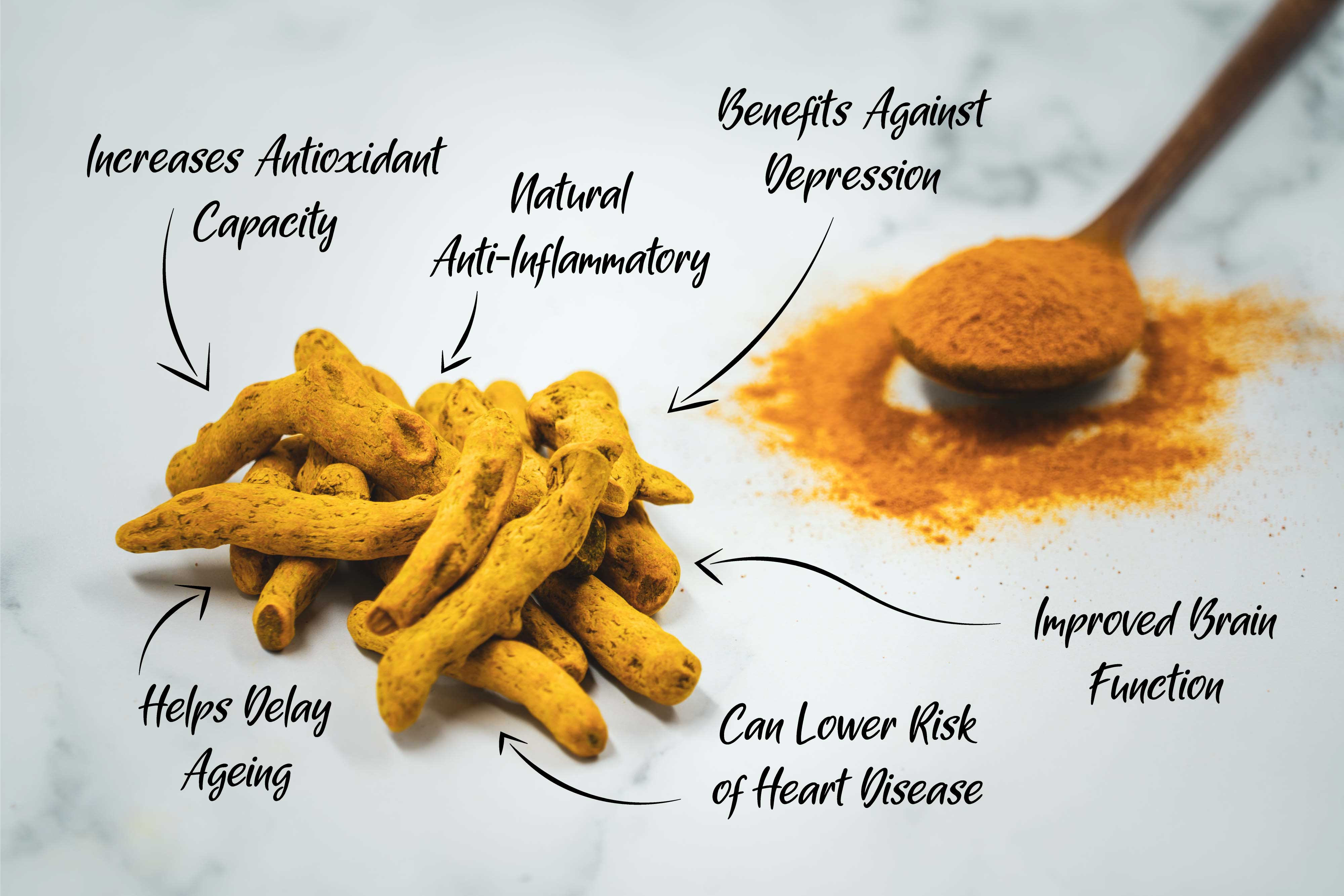Note: This article does not constitute medical advice. Please consult with your doctor before making any decisions regarding your health
Turmeric has been used in Ayurveda medicine for thousands of years. It contains a compound called Curcumin, which may be the reason why many people find it extremely helpful against many different ailments such as cancer, arthritis pain, heartburns, and more. Here we will talk about Turmeric's health benefits in great detail.
An average person consumes over 100 pounds of sugar every year alone. Most people also consume way too much-saturated fat (which leads to clogged arteries) and sodium (which causes high blood pressure).
In addition, most people don't get enough exercise and thus their bodies aren't burning calories properly. This combination leads to obesity, diabetes, hypertension, etc., all of which cause complications later on in life.
The best solution for managing these conditions is through diet and lifestyle changes. However, even if you manage your diet well, you still need an effective dietary supplement to keep yourself healthy throughout the day. And one of the most popular supplements out there by far is Turmeric.
This article will explain how Turmeric works. Thus, you'll know whether or not it could potentially benefit your health or not. We will discuss its uses, where to find it, how it affects certain medical issues, and other important information related to its use.
Curcumin
Curcumin, a polyphenol antioxidant, is responsible for giving turmeric its bright yellow color. Like resveratrol, another powerful antioxidant, curcumin offers numerous potential health benefits due to its anti-inflammatory properties and its ability to fight off free radicals.
As mentioned before, inflammation plays a major role in almost all chronic diseases today. Therefore, reducing inflammation in our body would certainly lead to better health.
In fact, studies show that curcumin reduces symptoms associated with several inflammatory disorders including rheumatoid arthritis, osteoarthritis, multiple sclerosis, Alzheimer's disease, and Parkinson's disease.
Other common problems curcumin can treat include allergies, eczema, psoriasis, gallstones, ulcers, infections, and digestive problems such as constipation, diarrhoea, gas, bloating, and indigestion.
It appears that curcumin might be able to prevent cardiovascular disease, stroke, cancers, cataracts, dementia, depression, fibromyalgia, headaches, migraines, muscle pains, memory loss, skin ageing, and type 2 diabetes.
Studies even suggest that curcumin may improve athletic performance by increasing endurance and strength while decreasing fatigue levels!
Turmeric curcumin supplements can be helpful for those trying to maintain a healthier lifestyle. It aids in lowering LDL ("bad") cholesterol levels and raises HDL ("good"), thereby preventing coronary blockages. Turmeric also promotes the breakdown of triglycerides.
How does it work?
Curcumin binds itself to proteins called transcription factors within cells. These transcription factors then inhibit COX-2 expression, which prevents prostaglandin E2 from being produced in response to tissue injury or infection. By inhibiting the production of PGE2, curcumin decreases the amount of inflammation present in our body.
Curcumin also inhibits NF-kB activation, another protein involved in regulating immune responses. Inhibiting NF-kB allows white blood cells to destroy foreign particles without causing excessive damage to the surrounding tissues.
Another study conducted by scientists in India showed that curcumin effectively inhibited IL-1 beta secretion, which subsequently reduced bone destruction caused by joint inflammations.
Where can I get it?
You can purchase Turmeric extract online or at stores near you. There are two types of products - capsules containing ground-up powder, and tablets. Capsules contain higher concentrations of curcumin than tablets, but they're harder to digest since they come preground.
They are usually cheaper than tablets however because they require fewer resources during manufacture. If you decide to buy capsules, make sure you choose the organic ones.
Tablets are easier to swallow and absorb, making them ideal for those who want to experience immediate results. You can also find pure powdered turmeric available online, but please remember that this form of intake doesn't provide as much bioavailability when compared to tablets and capsules.
One thing to note though is that Turmeric isn't regulated by the FDA, nor are manufacturers required to prove safety or efficacy. That means you shouldn't rely solely on product labels to determine quality control standards.
Always check reviews posted by former customers to see if something sounds fishy. Also, be aware that natural herbs sold over the counter often carry greater risks for adverse reactions than prescription drugs. Be careful with any herbal remedies or dietary supplements you intend to consume.
Side Effects & Interactions
Since curcumin is considered safe, there won't be any severe side effects. Most users report feeling energized after drinking a cup of hot water mixed with 1 teaspoon of Turmeric. Some people complain of mild stomach discomfort such as burping and nausea.
As previously stated, turmeric caps cannot be taken along with NSAIDs. On the contrary, black pepper increases the absorption of both curcuminoids and piperine. So if you plan to drink green tea with Turmeric, add a few fresh black pepper on top. Black pepper also enhances the taste of Turmeric. Since curcumin is acidic anyway, adding black pepper actually makes it slightly alkaline.
Other possible side effects include allergic reaction, headache, upset stomach, flatulence, dehydration, and intestinal distress. Drink plenty of fluids while taking Turmeric to stay hydrated. Avoid alcohol consumption while taking curcumin supplements because alcoholic beverages decrease the effectiveness of curcumin.
We also recommend consulting a doctor prior to starting any new herbals or medications. People suffering from kidney stones should consult a physician first before taking anything containing potassium. Anyone currently being treated for tuberculosis should avoid taking curcumin. Besides, those undergoing chemotherapy should avoid taking curcumin altogether.
Why do some people say that Turmeric tastes like dirt?
Many people believe that Turmeric tastes terrible. But according to others, Turmeric has a very unique scent that reminds them of dirt. Personally, I think the smell varies depending upon personal preferences.
For example, I personally love the odour. On the other hand, others despise it. Try blending it with coconut oil to mask unpleasant smells. Of course, if you hate the flavour of Turmeric, you can always mix it with honey or cinnamon to enhance its taste.
Does Turmeric help in losing weight?
Yes, eating Turmeric regularly can help reduce appetite and aid digestion. When combined with exercise, it can increase energy expenditure and promote fatty acid oxidation. One study concluded that subjects lost 7% more total body mass when supplemented with 3 grams of curcumin per day for 12 weeks.
Another research shows that curcumin improved fasting glucose levels in patients with metabolic syndrome. Yet another research suggests that curcumin supplementation improves insulin sensitivity in obese individuals.
While Tumeric Curcumin supplements offer optimal benefits, before concluding if Turmeric reverses ageing and slows down cognitive decline, additional human trials must be completed to prove this.


